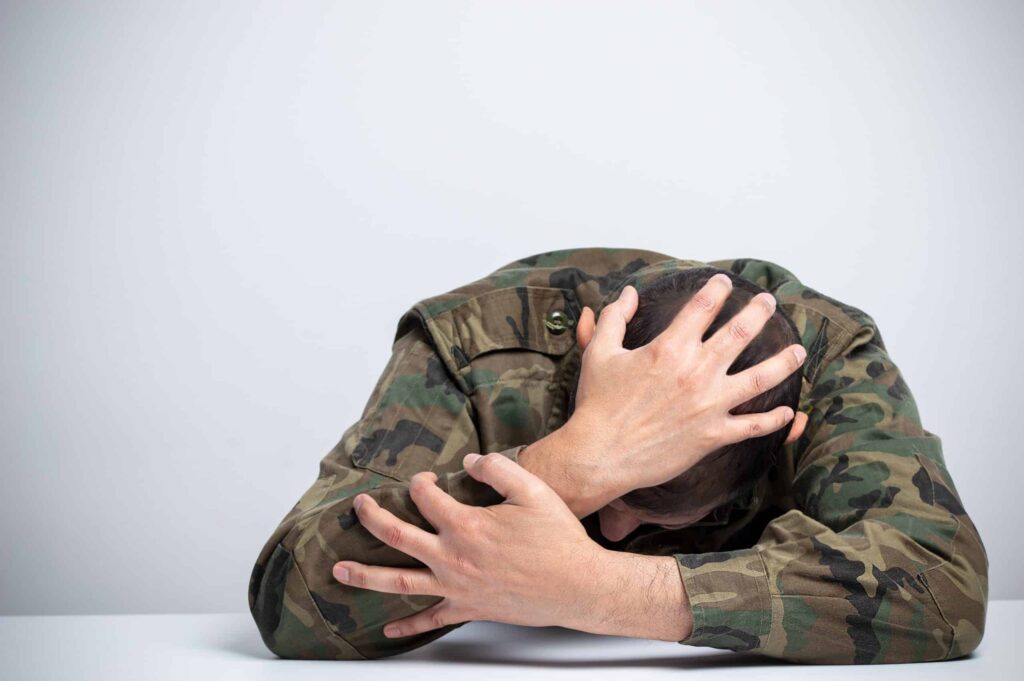Alcohol and stress in the military are common and significant problems. Military culture accepts the use of alcohol to cope with stress, boredom, loneliness, and the lack of other coping mechanisms. A high percentage of the military also experience symptoms of post-traumatic stress disorder (PTSD), depression, and anxiety which induce more stress and high levels of anger. Reaching out for alcohol for relief from high levels of stress is often the leading factor in developing an alcohol use disorder.
What Are the Leading Stress Factors for our Military?
Those experiencing combat are more likely to experience high amounts of stress causing them to reach out for alcohol to relieve uncomfortable feelings and depression. Stressful life events in the military can be extreme and traumatic, leading to the development of PTSD. Alcohol abuse is a common unhealthy way of coping with these symptoms due to its accessibility. Alcohol and stress in the military are also associated with high levels of anger. Drinking alcohol is more socially acceptable within the military culture than other substances.
Leading stress factors for the military leading to increased alcohol consumption:
- Symptoms of PTSD and depression
- Traumatic images and experiences in combat
- High levels of fear and anticipation of death
- Combat and injuries incurred in combat
- Military sexual trauma
While alcohol is used for self-medication of the symptoms of PTSD, it does not relieve the symptoms of PTSD and makes the symptoms worse. Alcohol use disorder can lead to problems in the recovery of PTSD down the road. Both disorders need to be addressed when considering treatment for recovery.
How Stress Leads to Alcohol Abuse in the Military
With the high numbers of military personnel experiencing the symptoms of PTSD, studies have found alcohol to be the number one coping mechanism for relief. PTSD has three major symptoms contributing to the need for alcohol for relief.
- Re-experiencing of traumatic events like nightmares and flashbacks
- Over arousal, hypervigilance, high startle response and sleep disturbances
- Avoidance behaviors, including withdrawal from people, places, and reminders of traumatic events
These three major symptoms cause an impaired ability to cope positively with social, educational, and work environments. With every aspect of life affected, stress levels remain high, and alcohol is the leading acceptable coping mechanism. In some cases, alcohol use can also be an avoidance behavior.
Other symptoms experienced with alcohol and stress in the military include:
- Sleep disturbances can cause alcohol usage because of beliefs that the alcohol will cause deep sleep, but it does the opposite. Alcohol use can cause an ineffective quality of sleep.
- For those wanting to numb uncomfortable feelings of anger, irritability, and depression, which are symptoms of PTSD, there is a belief that alcohol will offer relief, but it really just makes the symptoms worse.
- While there is a belief that alcohol can allow a moment of forgetfulness from unwanted memories and thoughts, alcohol does not solve the problem.
Treating Veterans: PTSD and Alcohol Abuse
Studies have shown that treating Veterans for PTSD and alcohol abuse disorder at the same time works well. The therapies associated with alcohol and stress in the military are well-known treatments. Medication may also be needed to be prescribed to help with symptoms until treatment can be begun and progress is made in lessening discomfort. Alcohol and stress in the military have been the topic of many studies for the best therapies to resolve this difficult problem.
Therapies for treating PTSD and alcohol abuse include:
- Cognitive processing therapy (CPT) is a type of cognitive behavioral therapy. This type of therapy teaches how to process and change upsetting thoughts from a trauma. Changing your thoughts of the trauma can change how one feels about them. Trauma can change the thinking processes and cause disturbing thoughts to invade every aspect of life. CPT offers a new way of thinking once disturbing or stressful thoughts enter the mind. New positive coping mechanisms are put into place.
- Prolonged exposure is a type of psychotherapy for PTSD. This therapy points to avoidance behaviors which are a common symptom of PTSD to change that behavior. This is another form of cognitive behavior therapy and involves confronting uncomfortable feelings, emotions, memories to explore how to resolve them. Facing fears and taking control of them allows freedom from avoidance behaviors.
Treating the substance use disorder uses cognitive behavioral therapy as well. Facing anger issues, pain management options, and sleep disturbances can alleviate more stress and help with recovery. The first step is reaching out for help in getting better. It is okay to make the decision to get treatment and explore your options for recovery. Alcohol and stress in the military are common issues and there are many effective treatments that work hand in hand.
Treatment for Alcohol and Stress in the Military
If you are experiencing problems from alcohol and stress in the military, Sunrise Veterans Health offers professional staff to answer any questions you may have concerning treatment to begin a journey to wellness and a positive, satisfying lifestyle. Call or visit our admissions page today, and we will help you meet your goals in recovery from alcohol addiction.


